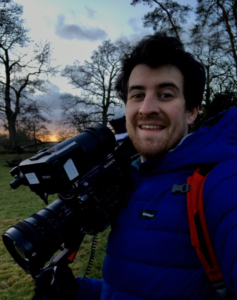
Dom Walter graduated from the University of Exeter, Penryn Campus in BSC Biological Sciences with Study Abroad 2013, followed by MSC Conservation and Biodiversity 2014. He’s currently an Assistant Producer with the BBC Natural History Unit.
Tell us about your career, and the exciting things you’ve been working on…
Since leaving Exeter I have been working in the film industry, specifically making scientific and natural history documentaries. Scientific documentaries are a great source of knowledge; they have always inspired me to explore and learn more about the complex world we live in. A major reason why I decided to venture into scientific film is that, during my time at University, the dissemination of scientific findings and the challenge of putting them into a relatable context via means of visual presentations was the most enjoyable aspect of my course. Television is a powerful medium for communicating scientific research to the public; it uniquely transports people into a world, which would otherwise be inaccessible. It also captures events at a specific time and space, making them accessible for generations to come.
“I’ve dined on the border of North Korea, hung out with astronauts, flown in helicopters over glaciers in Alaska, and touched a Tyrannosaurus rex as it was being exposed for the first time in sixty six million years!”
Television creates a window through which future generations can witness all the weird and wonderful flora and fauna which, due to the recent elevated extinction rates, they may not have had the opportunity to observe first hand. One of the best things about working in this industry is by far the unparalleled access to places and people you get. Over the last couple of years, I’ve dined on the border of North Korea, hung out with astronauts, flown in helicopters over glaciers in Alaska, and touched a Tyrannosaurus rex as it was being exposed for the first time in sixty six million years!
What advice would you give anyone interested in getting into natural history broadcasting?
Grab a camera, an iPhone will do, and practice visual storytelling. Find something that captures your imagination and run with it – make a film! Could be on anything from understanding the iridescence of neck plumage of a pigeon on campus, to flying out to Borneo and capturing the mellifluous love songs gibbon pairs perform every morning!
Speak to as many people in the industry as possible. Call up and email production companies and try book in some work experience with them. You will get a lot of rejection but don’t worry, it only takes one acceptance to get your foot in the door so be tenacious.
What are your plans for the future?
I hope to direct a BBC landmark series with the man himself, Sir DA!
